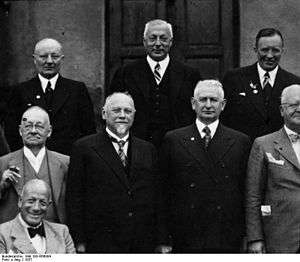Friedrich Flick
Friedrich Flick (born 10 July 1883 in Ernsdorf, Siegerland; died 20 July 1972 in Constance) was a German industrialist and convicted Nazi war criminal. After the war, he reconstituted his businesses, becoming the richest person in West Germany, and one of the richest people in the world, at the time of his death in 1972.
He initially built a fortune during World War I and became extremely wealthy during the Weimar Republic, establishing a major industrial conglomerate in the coal and steel industries.
War crimes
The Flick trial was one of the 12 Subsequent Nuremberg Trials of the military, political, and economic leadership of Nazi Germany, held after the Nuremberg trials (the "Trial of the Major War Criminals before the International Military Tribunal"), the most well-known trials which tried 22 of the most important captured Nazis. Like the other trials, the Flick trial took place at the Palace of Justice.
The defendants in this case were Friedrich Flick and five other high-ranking directors of Flick's group of companies, Flick Kommanditgesellschaft, or Flick KG. The charges centered on slave labor and plundering, but Flick and the most senior director, Otto Steinbrinck, were also charged for their membership in the "Circle of Friends of Himmler." The circle was a group of influential German industrialists and bankers—founded in 1932 by Wilhelm Keppler and taken over by Himmler in 1935—for the purpose of giving financial support to the Nazis. Its members "donated" annually about 1 million Reichsmark to a "Special Account S" in favor of Heinrich Himmler.
Later career
Despite being found guilty in the Nuremberg Flick Trial, and being sentenced to seven years, including time already served, he quickly became one of West Germany's richest people by the 1950s and the largest shareholder of Daimler-Benz. He was awarded numerous honours, including the Grand Cross with Star and Sash of the Order of Merit of the Federal Republic of Germany in 1963 and the Bavarian Order of Merit, and was an honorary senator of the Technical University of Berlin. At the time of his death, his industrial conglomerate encompassed 330 companies and around 300,000 employees.
His heirs were his son Friedrich Karl Flick and his grandson Friedrich Christian Flick, who established the modern art gallery Friedrich Christian Flick Collection.

See also
- Nuremberg trials
- Alfried Krupp
- IG Farben
- Slave labour
- War criminals
Further reading
- Thomas Ramge: Die Flicks. Eine deutsche Familiengeschichte um Geld, Macht und Politik. Campus-Verlag, Frankfurt am Main 2004, ISBN 3-593-37404-8.
- Günter Ogger: Friedrich Flick der Grosse. 3. Auflage. Scherz Verlag, Bern-München-Wien 1971.
- Kim Christian Priemel: Flick - Eine Konzerngeschichte vom Kaiserreich bis zur Bundesrepublik. Wallstein Verlag, Göttingen 2007, ISBN 3-8353-0219-1.
- Norbert Frei, Ralf Ahrens, Jörg Osterloh, Tim Schanetzky: Flick. Der Konzern. Die Familie. Die Macht. Blessing Verlag, München 2009, ISBN 978-3-89667-400-5